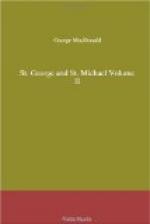’Nay, mother; but I will do nothing thou wouldst think dishonourable—that I promise thee. I will use what thou tellest me for no manner of hurt to my lord of Worcester or aught that is his. But Lady is not his, and her will I carry, if I may, from Raglan stables back to Redware.’
’I am content. Hearken then, my son. Raglan watchword for the rest of the month is—st. George and st. Patrick! May it stand thee in good stead.’
‘I thank thee, mother, with all my heart,’ said Richard, rising jubilant. ’Now shut up the dog, and let me go. One day it may lie in my power to requite thee.’
’Thou hast requited me beforehand, master Heywood. Old mother Rees never forgets. I would have done well by thee with the maiden, an’ thou would but have hearkened to my words. But the day may yet come. Go now, and return with the last of the twilight. Come hither, Marquis.’
The dog obeyed, and she shut him again in her chamber.
CHAPTER XXVII
The moat of the keep.
Richard left the cottage, and mounted Oliver. To pass the time and indulge a mournful memory, he rode round by Wyfern. When he reached home, he found that his father had gone to pay a visit some miles off. He went to his own room, cast himself on his bed, and tried to think. But his birds would not come at his call, or coming would but perch for a moment, and again fly. As he lay thus, his eyes fell on his cousin, old Thomas Heywood’s little folio, lying on the window seat where he had left it two years ago, and straightway his fluttering birds alighting there, he thought how the book had been lying unopened all the months, while he had been passing through so many changes and commotions. How still had the room been around it, how silent the sunshine and the snow, while he had inhabited tumult—tumult in his heart, tumult in his ears, tumult of sorrows, of vain longings, of tongues and of swords! Where was the gain to him? Was he nearer to that centre of peace, which the book, as it lay there so still, seemed to his eyes to typify? The maiden loved from childhood had left him for a foolish king and a phantom-church: had he been himself pursuing anything better? He had been fighting for the truth: had he then gained her? where was she? what was she if not a living thing in the heart? Would the wielding of the sword in its name ever embody an abstraction, call it from the vasty deep of metaphysics up into self-conscious existence in the essence of a man’s own vitality? Was not the question still, how, of all loves, to grasp the thing his soul thirsted after?




